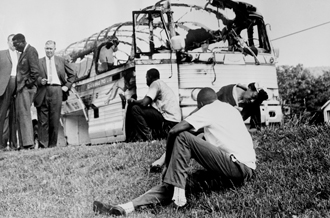'Freedom Riders' set to appear on campus
In May 1961, a group of 13 civil rights activists (seven of them black, six white), boarded two public buses in Washington, D.C., intent on traveling through the Deep South to test a Supreme Court decision that made enforced segregation in interstate travel illegal. Their destination was New Orleans, but after a number of brutal attacks, including a firebombing and multiple beatings, the riders never made it to the Crescent City.

Freedom Riders sit beside a burned-out Greyhound bus outside of Anniston, Ala. (Copyright Bettmann/Corbis / AP Images)
“The Civil Rights Movement was certainly a defining element of that time,” says Kelley, who notes that both the women's movement and the anti-war movement of the '60s resulted in large part from the unwavering commitment and strategies of civil rights activists.
Kelley says her students are generally “in awe” of the men and women who risked physical harm during not only the freedom rides but in countless other acts of civil resistance and disobedience.
“Today, we protest things and sign online petitions with a push of a button, and we've done our bit,” says Kelley. “That's not like repeatedly putting your life on the line. Students see that level of dedication, and I know some wonder about what they are doing with their lives and their dedication to any event or cause.”
The opportunity to have living witnesses to that historic time appear on campus is a remarkable opportunity, says Kelley.
“Everyone can benefit from coming to this event and hearing these people's stories,” she says.
The panel discussion “Freedom Riders: 50 Years Later” will take place Wednesday (Nov. 14), from 6 to 8:30 p.m. in Room 204 of Jones Hall. It is free and open to the public. The discussion will be taped by C-SPAN's American History TV.
